

On Stage - Head Table - The Membership - Blacklist - Visitors
|
As good as Lou might have been at making friends,
Ed Burns ("Big Ed")REVOKED, 1882 Burns was notorious throughout the West as a killer and con man, fond of the top and bottom scam where rubes were encouraged to bet that the top and bottom faces of any given throw of three dice would add up to twenty-one — a sure thing, until mis-marked dice were introduced to the game. He was also fond of the gold brick scam. Marshal Sam Blonger kicked Big Ed out of Albuquerque in February, 1882. More about Big EdCharles M. Fegenbush ("The Baron")REVOKED, 1898 AKA: Fegen-Bush, Fagan-Bush, Fagenbush In 1898, Lou found himself the victim of one of his associates, Charles Fegenbush. Thinking he was financing a stock swindle, Lou gave Fegenbush and John Weaver $1000 in hopes of a ten percent return. When the check disappeared, and Fegenbush insisted he didn't have it, Lou went crying "bunko" to the cops — who couldn't believe their ears. The story was recounted often among Denver policemen for many years. More about Fegenbush & DuBoisJ. Frank Norfleet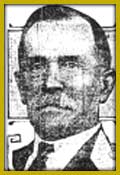
BANNED, 1921 Taken, twice, for a total of $45,000, Norfleet pursued Joe Furey and his gang across thousands of miles, at his own expense, just in time to help Col. Van Cise spring his trap on the Blonger gang. The diminutive retired farmer spent more than two years tracking down the gang — who worked under Lou's protection when in Denver — personally apprehending one member at a time, acting as a lawman when necessary, other times posing as a sucker and always packing heat. More about NorfleetLen Reamey ("Les Randle")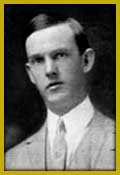
REVOKED, 1922, uncontested Young and handsome, Reamey found a place on Lou Blonger's big store crew as a Bookmaker in the fake exchange, responsible for presenting a believable front to the operation and handling the exchange of money. Following the bust in 1922, Reamey — called Les Randle in Fighting the Underworld — was persuaded to turn state's evidence by his distraught wife and District Attorney Van Cise, sealing Lou's fate. It was Reamey's description of the payoff game to Van Cise that we adapted for our page about the rag. Len's descendants report that after the trial, he went straight and never looked back, becoming a model citizen and family man. William Sturns ("The Painter Kid")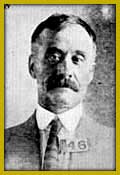
REVOKED, 1922 The inspiration, perhaps, for The Sting's Kid Twist, William Sturns was a steerer for the Blonger gang for over three years. He was thought by his fellow Denver grifters to have been the writer of a series of letters sent to Van Cise early in his investigation, laying out the gang's structure and methods. He claimed to have been double-crossed on a payoff and wanted to see the operation go down. Adjutant General Thomas J. TarsneyBANNED, 1894 In 1894, Colorado Governor D.H. Waite needed a man he could trust to when he sent the Colorado militia to wrest control of Denver city hall from city officials and their patrons in the gambling trade, and again a few weeks later to bring order to Cripple Creek's mining district when the local sheriff's department faced off against striking miners during the Battle of Bull Hill. Unfortunately for Tarsney, he made no friends in the process, and ended up alone one night on the plains outside Colorado Springs, covered with tar and feathers. More about Gen. TarsneyPhilip S. Van Cise ("The Colonel")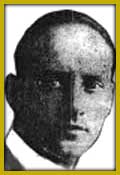
BANNED, 1921 Col. Philip S. Van Cise, an idealistic young veteran of the Great War, proved to be Lou Blonger's great nemesis, and his ultimate undoing. On August 24, 1922, Van Cise and his force of Colorado Rangers and interested civilians fanned out across the city, arresting as many of Lou's gang as possible before word leaked out through talk on the street, a suspect's wife, or even the Denver police. They got thirty-two before the day was done. More about The ColonelGovernor Davis H. Waite ("Bloody Bridles")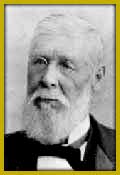
BANNED, 1894 Elected governor of Colorado as a populist in 1892, Waite twice found himself sending the Colorado militia to deal with forces in league with the Blonger Bros., first in his military asault on Denver City Hall, and shortly thereafter when he sent the militia to keep order during the Battle of Bull Hill. More about Governor WaiteEmma K. Loring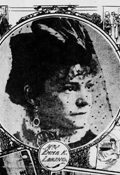
BANNED, 1889 Lou married San Francisco socialite Emma K. Loring in 1882, while he was otherwise occupied with Sam back in Albuquerque. Their marriage ended unceremoniously in 1889 when Lou sued her for abandonment. Emma eventually died alone in her San Francisco home. More about Emma K. LoringJesse WheatALERT, 1893 Sam wasted no time after his divorce from second wife Sadie (aka Kitty Blonger) in 1893, promising himself to Jesse Wheat, then reneging and marrying Virginia Pierrepont two months later. If you see her, BOLT THE DOOR and CALL SAM. "Jesse Wheat has been jilted and she is not happy. Samuel H. Blonger is the man who she says disappointed her, and she thinks the anguish of mind that she has suffered by his cruel action is worth just $25,000. She has sued Mr. Blonger in the district court to recover this amount. In her complaint she alleged that the defendant on Aug. 1 last promised to marry her and that he renewed his promise at various times since then. Recently, however, his manner changed and he refused to marry her. Blonger's first wife obtained a divorce from him on the grounds of extreme cruelty some time ago. The above is from the Denver Times. Mr. Blonger was marshal of Albuquerque in the early days. While here Sam was regarded as a very pleasant gentleman but bad associates in Denver no doubt ruined him." |
